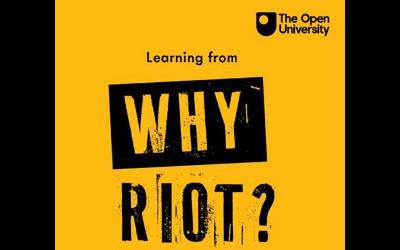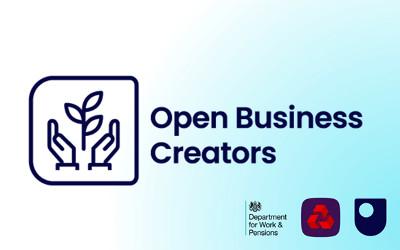Youth-led education key to reducing youth violence in Belfast, new report finds

Giving marginalised young people access to a youth-led, innovative and flexible education programme delivered by frontline youth workers in their local areas can change lives and lay the groundwork for long-term, peaceful change. This is the finding of ‘Learning from Why Riot?’, a powerful new report from The Open University based on a research partnership with five local youth organisations working with at-risk young people in interfaces and areas of deprivation across Belfast.
This research has found that youth violence, antisocial behaviour and self-destructive actions are significantly reduced through this programme, which also lays the ground for a more inclusive, peaceful and prosperous society for all. The report also sheds light on the corrosive social and health issues behind youth violence.
Learning from Why Riot?: Addressing the whys beneath youth violence (LfWR) presents evidence from a unique collaboration between academics and grassroots youth workers who adapted The Open University short course Why Riot? for use in community settings. Co-created by The Open University and The ACT Initiative in the aftermath of riots in the Spring of 2021, Why Riot? is designed to enable young people growing up in communities affected by violence to think critically, make independent decisions and use their voice constructively for change.
Youth workers delivered Why Riot? as a youth programme to 60 young men and women aged 13 to 17 in five Belfast locations all of which are among the top 10% most deprived in Northern Ireland and designated Neighbourhood Renewal Areas .70% of participants were boys. Most were detached from any youth provision, and many struggled with formal education or had disengaged from school. The results from this 18 month study are striking: 67% of participants are now on a positive path toward fulfilling their potential, as measured by the Meaningful Change Framework - a tool developed by the LfWR co-research team to evaluate real-world outcomes in areas including emotional safety, independent decision making, and critical thinking.
“Crucially, the report finds that unmet needs for emotional and physical safety, and for feeling seen and heard, alongside wider structural issues are underlying drivers of youth violence,” said Gabi Kent, research lead author and Senior Knowledge Exchange Lecturer at The Open University. “The report calls for a holistic, cross-departmental approach to tackling its causes rooted in poverty and inequalities alongside programmes to develop critical thinking skills. Flexible, responsive and long-term funding should be invested in the Why Riot? programme and related youth needs-led education interventions, recognising the role of frontline youth workers as much more than a ‘4th emergency service.”
Through using the Why Riot? programme youth workers demonstrated how flexible, long-term engagement with young people, guided by and responsive to their specific needs, is personally transformative. Self-destructive and self-harming behaviours also dramatically reduced with four out of five groups reporting 100% reductions in their engagement in interface violence/ASB that was sustained at the end of the study (November 2024). While this study was conducted in Belfast, the findings also suggest that the Why Riot? programme can be adapted for young people in other communities and contested contexts.
The LfWR report goes beyond academic research - it offers a practical, open-access education resource that has shown measurable, meaningful improvements in the lives of young people.
“We’ve witnessed a shift in the young people who participated – they’re asking bigger questions, reflecting more deeply, and challenging the choices they make,” said Stephen Hughes from St Peter’s Immaculata Youth Centre, one of the partner youth organisations. “The course provided them with a safe space to explore what peace really means, and more importantly, what role they can play in it. That’s invaluable in communities like ours.”
Youth participants from the report reflected how:
Why Riot? will help people understand their family, community and themselves.
It helped me know myself better.
It helped me not want to riot.
Gabi Kent added, “The report’s findings and recommendations will resonate with efforts anywhere to promote social inclusion and tackle inequalities. While recognising current funding challenges and public service pressures, the value of investing in targeted long-term funding for these young people has been highlighted. One of our key recommendations is the co-creation of a Northern Ireland Violence Reduction, or Nonviolence Hub that is devised with, and draws directly on the expertise and experiences of youth and community workers, young people and their communities in these interface and deprived areas.
The organisations involved in the research alongside The Open University included:
- Education Authority East and North Belfast Area Projects
- Lagmore Youth Project, West Belfast
- St Peter’s Immaculata Youth Centre, West Belfast
- South Belfast Alternatives Restorative Justice
- Why Riot? course co-creator Dr William Mitchell (The ACT Initiative)
The LfWR report and its five case studies are open access and freely available, enabling youth organisations, policymakers, educators and communities around the world to adapt and adopt the approach for local impact.
You can find more information on ‘Why Riot?’ on the project’s Open Societal Challenge page.
About Open Societal Challenges
The OU’s Open Societal Challenges programme aims to tackle some of the most important societal challenges of our time through impact-driven research.
The programme’s focus on the themes of Tackling Inequalities, Living Well and Sustainability align well with the OU’s mission to be open to people, places, methods and ideas.
The programme’s aim is to apply excellent research by OU academics to some of the most pressing challenges facing people across the UK and worldwide to transform lives and drive societal change.
Contact our news team
For all out of hours enquiries, please telephone +44 (0)7901 515891
Contact detailsNews & articles

Grant recipients announced for the 2025 Open Business Creators Fund for Women in Business
The businesses selected to receive funding from the Open Business Creators Fund for Women in Business, (delivered by The Open University and sponsored by NatWest) have been announced.